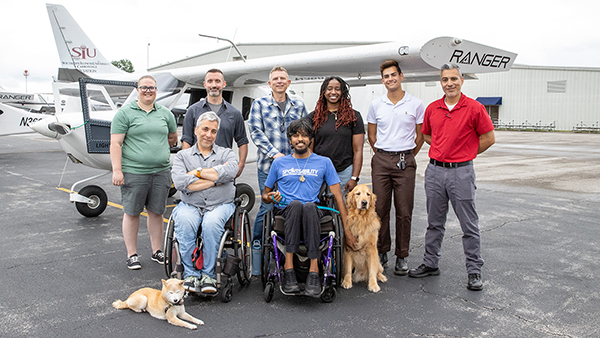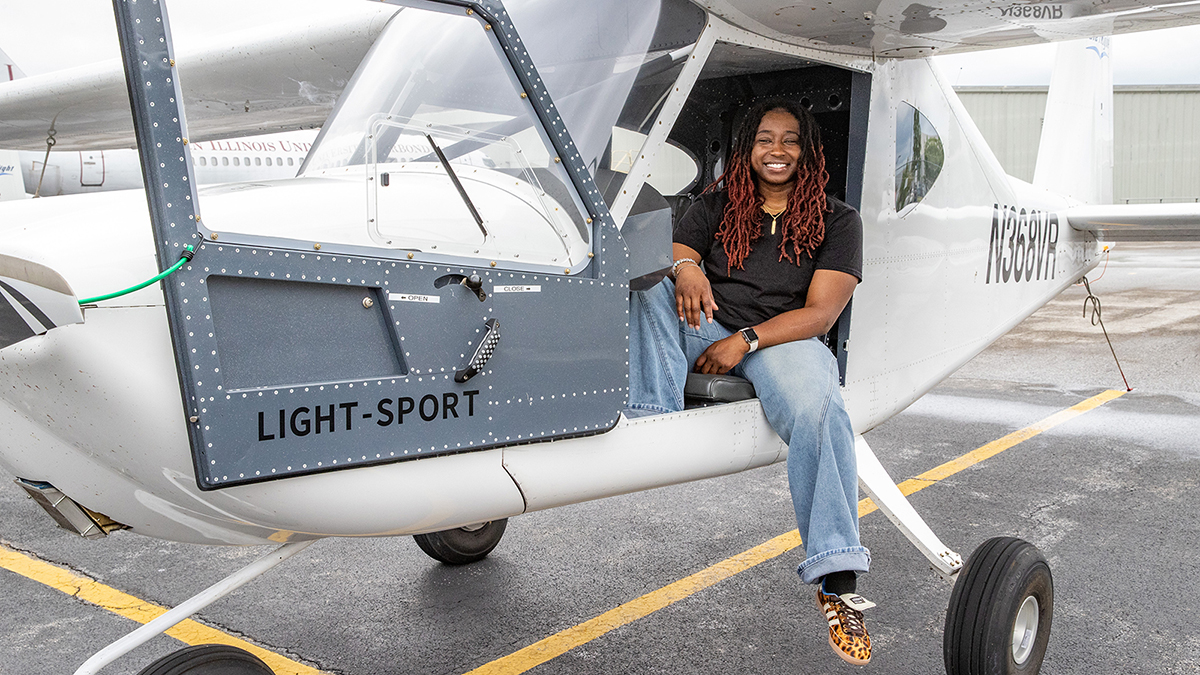
(Above) Able Flight student Brandi Fields sits in one of the Vashon Ranger Light Sport airplanes used in training students with physical disabilities to become licensed pilots. (Bottom photo) The second SIU Aviation Able Flight class is (front row, from left) students Chris Karadjov (with Ahri) and Ronny Ahmed (with Wallace) and (back row) SIU Aviation’s Victoria Mathieu, students Ryan Berndt, Domenico “Nick” Lazzaro, Brandi Fields, and SIU Aviation’s David Nelson and Miguel Marroquin. (Photos by Russell Bailey)
June 20, 2025
Able Flight, SIU Aviation offer the sky to student pilots with disabilities
CARBONDALE, Ill. — There are comparable skill sets that a trauma nurse and pilot must possess. Brandi Fields knows one and is quickly learning the other as one of five students in Southern Illinois University Carbondale’s 2025 Able Flight program hosted by SIU Aviation.
“There are a lot of transferable skills,” said Fields, a 29-year-old nurse from Kansas City, Missouri. “You are assessing the weather and making sure everything is correct with your airplane. In nursing, assessing is one of the biggest parts of our process. As a pilot, you always have to be aware of what could go wrong, so you have to think quickly on your feet. As an emergency room nurse and trauma nurse, I’m always thinking on my feet, and I’m very level-headed when it comes to things like that.”
Able Flight is a national nonprofit program for people with disabilities to become licensed pilots certified to operate light sport aircraft. The students received scholarships through Able Flight and have been staying in university housing since late May.
The training for Fields, Ronny Ahmed, Ryan Berndt, Chris Karadjov and Domenico “Nick” Lazzaro can be up to eight weeks and is expected to conclude in late June or early July, depending on weather. The students will finish by taking check rides.
Media availability
Reporters, photographers and camera crews interested in interviewing SIU Aviation training staff and Able Flight students should contact Victoria Mathieu, associate instructor, SIU Aviation, at 618-453-9238 or victoria.mathieu@siu.edu or Charles Stites, Able Flight executive director, at 919-942-4699 or info@ableflight.org to make arrangements.
As a “military kid” who traveled overseas while growing up, Fields always had an interest in aviation, but she never explored it because she didn’t know how to get into the industry and faced other barriers such as finances. Fields also noted that it wasn’t until two or three years ago while traveling prior to her spinal injury that she saw a Black female pilot.
After her injury rehabilitation, Fields returned to nursing on a remote basis and is now researching the potential of combining nursing and aviation.
With no prior experience “outside of video games,” Fields smiled when talking of the first time she piloted one of two specially adapted Vashon Ranger Light Sport airplanes.
“It was exciting; I’m an adrenaline junkie,” she said. “Now, we are at a point to where we are correcting little things I need to tweak. Taking off right now is something that I want to be better at because I want to be a little more level.”
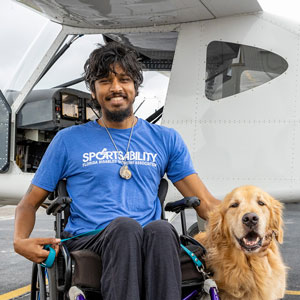 For Ronny Ahmed of Tallahassee, Florida, Able Flight is “the biggest adventure” he’s been on since his injury. He was one of two people injured in a 2014 shooting at Florida State University leaving him paralyzed from the waist down. Ahmed returned to finish his bachelor’s degree in biology and plans to pursue a graduate degree in microbiology or molecular biology next year.
For Ronny Ahmed of Tallahassee, Florida, Able Flight is “the biggest adventure” he’s been on since his injury. He was one of two people injured in a 2014 shooting at Florida State University leaving him paralyzed from the waist down. Ahmed returned to finish his bachelor’s degree in biology and plans to pursue a graduate degree in microbiology or molecular biology next year.
After extensive rehabilitation, the Eagle Scout is an accomplished scuba instructor — the first in the world with paraplegia. He has also participated in duathlons, is heavily involved in volunteer activities in Tallahassee working with children from elementary to high school, and is vice president of a nonprofit organization that works with veterans and children with disabilities.
“I was blessed enough to be accepted into the program,” he said. “I think it’s a sense of freedom because there are so many restrictions on being in a wheelchair. Even things that I know I can do people won’t let me do it because they think I can’t.”
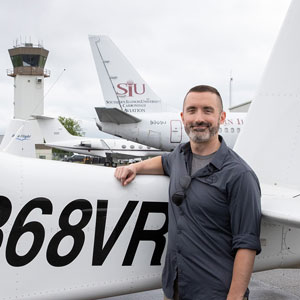 Ryan Berndt of Oshkosh, Wisconsin, works in the Experimental Aircraft Association (EAA) print and mail center and has been a member of the organization’s flying club for about two years. Able Flight’s aircraft has adaptive pilot controls that Berndt can use.
Ryan Berndt of Oshkosh, Wisconsin, works in the Experimental Aircraft Association (EAA) print and mail center and has been a member of the organization’s flying club for about two years. Able Flight’s aircraft has adaptive pilot controls that Berndt can use.
“For me, it’s actually nice being in the left seat for a change,” he said. “Basically, every other time I’ve been a small aircraft, I’ve been in the right seat. It’s a stark difference. It’s not easy, but I think the challenge has been fun.”
In addition to logging flight hours, Berndt said he is learning to be less critical of himself.
“Sometimes, you have really good days, and you will have other days where you are not feeling great about yourself,” he said. “I’m trying to not beat myself up too bad. You are just learning and can’t expect everything to fall into place and make sense right away.”
Berndt hopes to work with EAA to assist with the organization’s youth aviation program.
“I sat on working on a pilot’s license for so long, I would like for them to have the opportunity to not make the same mistakes I have and encourage them to not put this off,” he said.
Berndt said that he and his twin brother, Rodney, who is also a pilot, are making plans to once again attend the International Twins Day Festival in August in Twinsburg, Ohio, this time by plane.
“We are hoping we can actually fly out there this year; it will spare us the traffic,” he said.
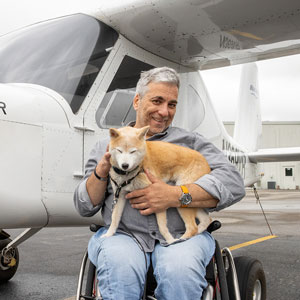 Chris Karadjov of Garden Grove, California, had decided to take lessons and earn his pilot certificate after his family gifted him a flight for his birthday in late 2011. A few weeks later, in early 2012, he was paralyzed from a skiing accident and didn’t imagine he could become a pilot. He later learned about Able Flight and was thrilled when Able Flight founder Charles Stites told Karadjov he was selected.
Chris Karadjov of Garden Grove, California, had decided to take lessons and earn his pilot certificate after his family gifted him a flight for his birthday in late 2011. A few weeks later, in early 2012, he was paralyzed from a skiing accident and didn’t imagine he could become a pilot. He later learned about Able Flight and was thrilled when Able Flight founder Charles Stites told Karadjov he was selected.
“It’s extremely challenging – one of the most, if not the most, challenging things I have done in my life,” said Karadjov, an associate professor of journalism and public relations at California State University Long Beach. “There is so much to learn, and the skills are critical. It’s not like you are giving a class or scoring a paper or writing for a publication – your life does not depend on that. It’s professional success. Here, literally, you are holding your life in your hands. It’s very high intensity.”
While there is much to learn, Karadjov said, the flight instructors are dedicated and understanding, and his classmates support each other. He’s becoming more comfortable with each flight lesson.
“Flying is extremely enjoyable, and the more I am learning, it is becoming second nature. You are not as stressed out, and you just enjoy it,” he said.
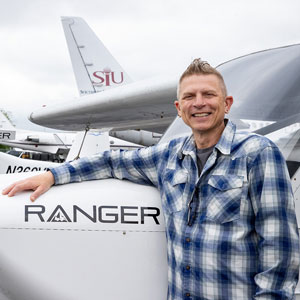 Domenico “Nick” Lazzaro already had a few flight hours after his injury when he came to Able Flight, but ground school and flight instruction have been excellent, he said. Lazzaro medically retired as a major after a combined nearly 20 years of service with the Army National Guard in Pennsylvania and New Jersey because of an injury during training exercises.
Domenico “Nick” Lazzaro already had a few flight hours after his injury when he came to Able Flight, but ground school and flight instruction have been excellent, he said. Lazzaro medically retired as a major after a combined nearly 20 years of service with the Army National Guard in Pennsylvania and New Jersey because of an injury during training exercises.
Even with his prior flying experience in a Piper J-3 Cub light airplane, Able Flight “has taught me a lot more about what I’m doing; why the plane does what it does, how it operates,” said Lazzaro, who is from Richboro, Pennsylvania, a suburb north of Philadelphia.
“It’s taught me a lot more about how a pilot has to multitask,” he said. “There is so much to flying an aircraft. It’s a lot more than you would expect.”
The instructors are patient and knowledgeable, and each offers something unique in their individual teaching styles that students are learning from, he said.
“For anyone who is disabled and dreams of flying, this is an excellent opportunity. Even if you cannot get into the scholarship because there are limited seats, there really should be nothing stopping you from trying to do it because it’s really a great experience,” Lazzaro said.
Thankful for ‘unique experience’
Each of the students credited Able Flight and Charles Stites, who founded the incorporated nonprofit in 2006. After a successful inaugural cohort at SIU last year, Stites formally transferred ownership of two Vashon Ranger Light Sport airplanes to the university, along with donating funds for program expenses at SIU for a minimum of seven years. The program had 98 licensed pilots complete the program prior to this year.
Victoria Mathieu, associate flight instructor with SIU, said this year’s class “has gotten off to a good start,” and even with frequent rain, the students have been able to log 12 to 15 hours flight time in the first three weeks.
Mathieu is pleased with Able Flight’s decision to allow SIU Aviation to host the program.
“We are hoping to continue as long as we can,” she said.
Plans are progressing to complete transition to SIU Aviation being Able Flight’s home by the end of the year, said Stites, who is looking forward to SIU Aviation building upon the nearly two decades of program success.
“We are excited to be in our second year of Able Flight at SIU, and we have another great class of students hard at work training to become licensed pilots,” Stites said. “The leadership at the airport and the flight instructors are doing a wonderful job providing the Able Flight students with this opportunity, and we are looking forward to honoring them as our newest pilots soon.”
The Able Flight experience is “very moving,” Fields said.
“Mr. Stites told me you don’t have to go into aviation after this program. It’s an opportunity to expose you to aviation and get your sport pilot license,” she said. “I’m grateful for that. I just didn’t see it as an opportunity for me before.”
Ahmed said Able Flight is not an extracurricular activity; the positive impact on mental health and physicality “is a big deal and hard to understand if you haven’t experienced it yourself.”
“This is a truly unique experience,” he said. “There are not a lot of people doing what Able Flight is doing. I really appreciate that Mr. Stites sees the value in it and he sees the importance of it. It’s hard to convince people that this stuff is important.”
(Editor’s note: Karadjov is pronounced KARA-joff.)
